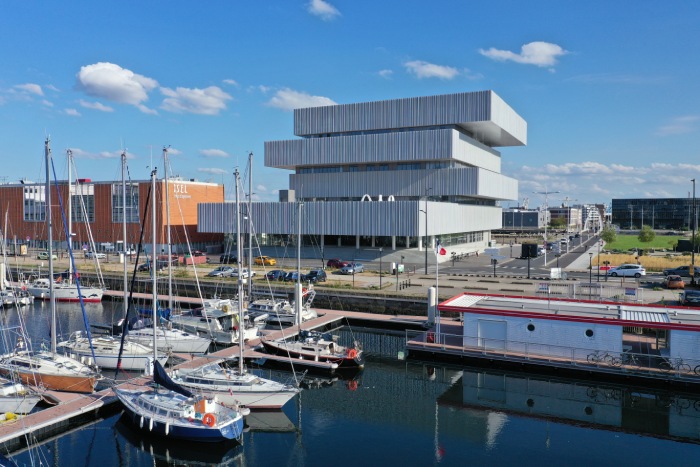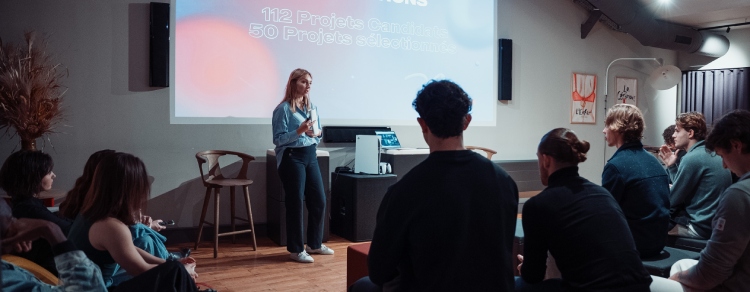

EM Normandie
The Business School’s Strategy
EM Normandie was founded in Le Havre, a port city at the heart of a region shaped by trade, exchange between people and cultures, and bold maritime ventures.
Over time, the School has combined maturity with a pioneering spirit, and local roots with an international outlook. For more than 150 years, it has moved forward, explored and grown, carried by the audacity of its origins and the pride it takes in its history.

Message from Anne-Sophie Courtier - Dean of EM Normandie
Today, this heritage is our guiding light. In a world facing uncertainty and deep change, it gives us the foundations we need to broaden our horizons; it shapes our strategy and illuminates our actions.
The keys to the future lie in our ability to build connections between knowledge and action, between regions and the wider world, between cultures and ideas. This belief underpins our purpose: to educate past, present and future generations to become contributors to a sustainable world - free to think, free to learn, free to choose and free to create.
We set our course and raise our sails around a clear vision: to become a School where everyone finds their place and the confidence to make a difference in a changing world. A place where people grow, dare, discover themselves, and cross their own seas. A demanding yet supportive environment that guides each student through their transformation, building bridges between academic knowledge and real-world experience, between self-confidence and openness to others, enabling them to navigate successfully in a complex and interconnected world.
This shared dynamic brings our whole community together - students, faculty, staff, alumni and partners alike - in a common endeavour: to shape a School guided by collective intelligence, creativity and commitment, ready to address the challenges of today and tomorrow. School for All, School for Life, School for Good.
The 2025-2030 strategic plan forms a bridge between our past and future: stability becomes a source of momentum, and a broad outlook, in every sense, reflects the School’s commitment. Anchored in guiding values - authenticity, engagement and audacity - its shapes each of our actions and reminds us both of the pride we take in our origins and of the relevance of the course we have set.
Key figures for 2030
- 7,000 students
- €100 million budget
- 250 academic partnerships
- 50 dual-degree or interdisciplinary partnerships
- 160 core-faculty members
- 100% of students, faculty and staff trained in responsible use of AI
Our mission « School for All, School for Life, School for Good »
EM Normandie is a contributive, responsible and impactful organisation that serves its communities and stakeholders in addressing current and future challenges. Its mission is articulated around three guiding principles:
School for All
EM Normandie is committed to making knowledge accessible and inclusive for the widest possible audience: learners, institutions, businesses, and civil society, so that each stakeholder is equipped to take meaningful action. Knowledge and skills are essential in enabling those we serve to respond to Society’s grand challenges and to broaden their horizons.
School for Life
The School seeks to integrate pedagogical innovation and artificial intelligence to support lifelong learning. It is dedicated to continually developing the competencies of learners, graduates and professionals by offering ongoing opportunities throughout their lives to acquire new knowledge and skills and to keep their own course firmly on track.
School for Good
Beyond preparing future generations to take action, EM Normandie recognizes its responsibility to contribute to a sustainable world and to support collective progress on societal and environmental issues. The School is committed to transforming its own model to become, by 2030, an institution whose actions help steer positive societal and environmental impact.
Our vision
EM Normandie aims to be a pioneering and inclusive business school - recognised in France and internationally - for its human-centred and sustainable education. It seeks to equip responsible, lifelong learners to navigate a complex and changing world, with independent thinking and the confidence to set their own course.

Our values
Legacy is a cornerstone of EM Normandie’s identity.
With deep Norman roots and strong ties to its maritime and port heritage, the School, founded in Le Havre in 1871, is one of the oldest business schools in France. This long history gives meaning to its development and ambition, while allowing it to remain true to its origins from one generation to the next: a School proud of its name and region, committed to passing on enduring values in a world of constant change.
Engagement has been central to EM Normandie's mission.
Since its creation by Jules Siegfried, a committed and visionary entrepreneur. It is expressed through a collective drive to develop innovative projects that bring together all members of the School's community: students, graduates, businesses, academic and institutional partners, and staff. This engagement is reflected in a strong involvement in contemporary social, economic and environmental issues, and in an active teaching approach that encourages students to become agents of change, both locally and internationally.
Audacity reflects the School’s boldness and pioneering spirit.
It has guided EM Normandie’s evolution over time, from the 2004 merger of SUP EUROPE CESEC and ESC Le Havre, to the launch of the five-year Grande École Programme in 2006, its later transition to a 3+2 format, and the decision in 2023 to move beyond the traditional preparatory class system. The creation of six campuses - including Dubai in 2022, a first for a French business school - illustrates this pioneering mindset, as do initiatives such as a port management programme for women and the redesign of curricula around competencies.
Strategic initiatives and goals 2025-2030
School for All - Explore worlds to foster knowledge, skills and diversity ‘for all’
Enhancing academic expertise, inclusivity, and global reach, while supporting both regional and international impact.
- Faculty: Attract and retain high-qualified international faculty who are committed to the School's mission, supported by an attractive HR policy, transparent career pathways, and a motivating academic environment.
- Research: Consolidate expertise in port, maritime, logistics and supply chain management; sustainability, circularity and territorial development; human resources and inclusive organisations; and digitalisation and AI. Strengthen international collaborations, develop research funding, and increase the dissemination of results to the academic community, wider audiences and decision-makers.
- International campuses: Consolidate local campus accreditations, expand academic (70% accredited) and economic partnerships, enhance engagement with local communities, and increase the School's global impact and visibility.
- IPER (Institut Portuaire d'Enseignement et de Recherche): Position IPER as the leading center of excellence in maritime and port training and research through specialised programmes, strong partnerships with industry stakeholders and the development of applied research.
School for Life - Offer distinctive, high-quality learning experiences closely linked to business and society
Providing distinctive, high-quality educational experiences that remain closely connected to business practice and societal needs.
- Executive Education: Strengthen links with professional practice, enhance the School’s international visibility, anchor executive provision in the Faculty’s areas of excellence, and contribute to societal impact through programmes in responsible and sustainable leadership.
- Academic Programmes: Align knowledge and competencies, expand interdisciplinary dual degrees in France and internationally (engineering, law, design, journalism, etc.), and maintain flexibility and innovation across Master's programmes to support graduate employability.
School for Good - Promote educational and societal innovation through responsible business education
Driving educational and societal innovation through responsible business education.
- Programmes and research: Promote educational and societal innovation across programmes and research, support faculty development, engage and develop student competencies, and monitor progress through a clear strategic roadmap.
- Student centric: Consider students as future graduates and provide each student with a tailored, transformative and inclusive educational journey that supports academic achievement, personal well-being and professional development.
- AI for Good: Train students, faculty, and staff in ethics and the responsible use of AI, update academic integrity policies, and encourage projects that generate positive societal impact through AI.
